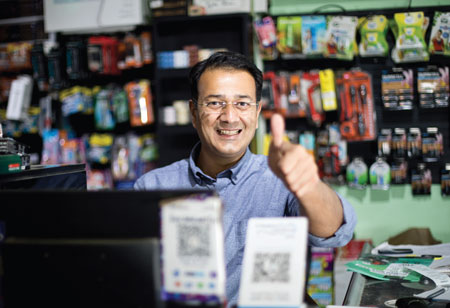
Ravi Garikipati : Making Credit Accessible For Small & Medium Businesses Using Technology, Creating Delightful Consumer Experiences


Ravi Garikipati
Co-Founder & CEO
In an exclusive interview with CEO Insights, Ravi shares his motivation behind venturing into FinTech sectors, the challenges faced in the sector and how does he overcome them, and much more:
Shed some light on your professional background and experience. What inspired you to venture into the finance domain and what drives you today?
I've been a technologist as well as an entrepreneur for around 30 years and have built many techled businesses both in the US and in India across many domains such as e-commerce and customer engagement before finally venturing into fintech. The fact of the matter is while a majority of this segment is great, the banks and the current financial institutions are still notable to understand the creditworthiness and hence, not able to provide timely credit to this segment. So that offers us a great opportunity to address this segment in a way that can be both cost-effective as well as provide timely help and services. And as a technologist, I strongly believe technology can be used as a disruptor here.
While there have been a lot of challenges in this sector in terms of availability of data, and cost associated with delivering these financial products to the under served, the only way to solve those issues is through a tech lead approach. Once we have the right product and solution, it can impact millions of people while changing their livelihood for the better, and that has been hugely motivating for me and is something that drives me today.
What are some of the major
challenges you have encountered so far in your journey? What did you learn from them and how did you overcome them to emerge as a successful professional?
Traditionally, the big banks have stayed away from offering their credit products to the under served small and medium businesses as they cannot underwrite due to a lack of relevant data around these small businesses. Even if you do get hold of data, it’s tough to make a business work due to the small ticket size,which is another major challenge.
To overcome these challenges, we use a diverse set of data points such as GST data, utility bills data, bank statements etc. and build a holistic borrower profile that allows us to extend credit where the big banks tend to stay away. We use a completely digital product to overcome operating cost challenges and together able to offer the right products for small businesses in India. We also partner with banks and use their financial strength and our technology capabilities to create products that can address the massive opportunity in front of us.
How has been your response to the challenges posed by the Covid affected market and the need for new strategies?
There were some major challenges posed by the pandemic, especially in the rural segments where we offer our services. The pandemic brought tremendous stress both economically as well as financially as people’s livelihood was under huge stress. That’s when we took the help of technology to digitize things such as disbursals, collection of payments while enabling zero physical contact during the pandemic.
We also worked with NGOs in some cases where the livelihood was impacted and reskilled many of our customers so they could find alternate livelihoods and this has helped us avoid delinquencies to a large extent. We also picked other segments that were more amenable to technology and were a bit more immune to the pandemic challenges, and are serving them digitally. That was a bit of a strategy shift due to the pandemic and has been our current focus.
Traditionally, the big banks have stayed away from offering their credit products to the under served small and medium businesses as they cannot underwrite due to a lack of relevant data around these small businesses. Even if you do get hold of data, it’s tough to make a business work due to the small ticket size,which is another major challenge.
To overcome these challenges, we use a diverse set of data points such as GST data, utility bills data, bank statements etc. and build a holistic borrower profile that allows us to extend credit where the big banks tend to stay away. We use a completely digital product to overcome operating cost challenges and together able to offer the right products for small businesses in India. We also partner with banks and use their financial strength and our technology capabilities to create products that can address the massive opportunity in front of us.
Once we have the right product and solution, it can impact millions of people while changing their livelihood for the better and that has been hugely motivating for me
How has been your response to the challenges posed by the Covid affected market and the need for new strategies?
There were some major challenges posed by the pandemic, especially in the rural segments where we offer our services. The pandemic brought tremendous stress both economically as well as financially as people’s livelihood was under huge stress. That’s when we took the help of technology to digitize things such as disbursals, collection of payments while enabling zero physical contact during the pandemic.
We also worked with NGOs in some cases where the livelihood was impacted and reskilled many of our customers so they could find alternate livelihoods and this has helped us avoid delinquencies to a large extent. We also picked other segments that were more amenable to technology and were a bit more immune to the pandemic challenges, and are serving them digitally. That was a bit of a strategy shift due to the pandemic and has been our current focus.
How would you define Davinta as an organization and its position in the market? How do you stay abreast of the changes in financial sector trends to steer your organization towards the future?
We are a RBI registered NBFC and a FinTech organization focused on responsible lending using technology for the under served small and medium business segment. We offer finance that is affordable, easy to use and contextual to small and medium businesses across all key categories like consumer durables, home appliances, footwear, FMCG.

To stay abreast of the latest changes, you have to be cognizant of the broader macro economy as well as other relevant parameters such as the industry trends, consumption patterns, GDP and growth rate and so on and figure out what opportunities they offer to you, given your strengths and positioning in the market. Once you are able to translate these trends, then you start looking at your segment differently in terms of the needs and build products that are more aligned to the needs.
Any piece of advice for the budding leaders who would like to set a benchmark in their career, especially in finance operations?
The advice I would like to give to budding entrepreneurs is to pick the right segment for their entrepreneurial journey. First pick the right segment that can offer scale for your business and then understand it deeply in terms of revenue generation. Always go for a technology first approach, as opposed to bringing technology as an after thought.
You also need to figure out your ecosystem for the businesses, don’t try to build everything on your own, leverage partners and utilize complimentary capabilities of others to build world class products. Finally, if the opportunity looks humongous, don't boil the ocean and day one. Start small, learn from that activity iterate and then scale.
Ravi Garikipati, Co-Founder & CEO, Davinta Finserv
Ravi is an entrepreneur with over 30 years of experience mostly in technology and executive leadership roles. He is also a board member and advisor to many late stage startups and an active angel investor in deepTech finTech and consumer Tech startups.
We are a RBI registered NBFC and a FinTech organization focused on responsible lending using technology for the under served small and medium business segment. We offer finance that is affordable, easy to use and contextual to small and medium businesses across all key categories like consumer durables, home appliances, footwear, FMCG.

To stay abreast of the latest changes, you have to be cognizant of the broader macro economy as well as other relevant parameters such as the industry trends, consumption patterns, GDP and growth rate and so on and figure out what opportunities they offer to you, given your strengths and positioning in the market. Once you are able to translate these trends, then you start looking at your segment differently in terms of the needs and build products that are more aligned to the needs.
Any piece of advice for the budding leaders who would like to set a benchmark in their career, especially in finance operations?
The advice I would like to give to budding entrepreneurs is to pick the right segment for their entrepreneurial journey. First pick the right segment that can offer scale for your business and then understand it deeply in terms of revenue generation. Always go for a technology first approach, as opposed to bringing technology as an after thought.
You also need to figure out your ecosystem for the businesses, don’t try to build everything on your own, leverage partners and utilize complimentary capabilities of others to build world class products. Finally, if the opportunity looks humongous, don't boil the ocean and day one. Start small, learn from that activity iterate and then scale.
Ravi Garikipati, Co-Founder & CEO, Davinta Finserv
Ravi is an entrepreneur with over 30 years of experience mostly in technology and executive leadership roles. He is also a board member and advisor to many late stage startups and an active angel investor in deepTech finTech and consumer Tech startups.
